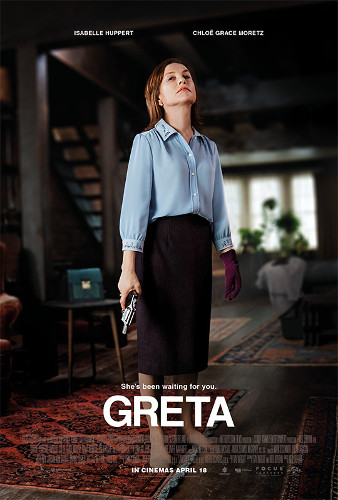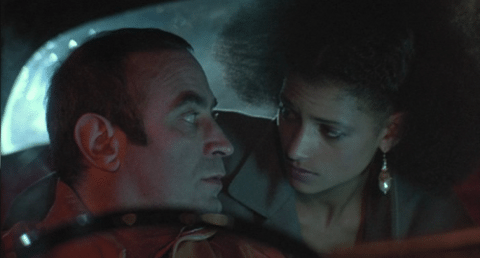Greta (2019)
Directed by: Neil Jordan
Written by: Neil Jordan, Ray Wright
Starring: Chloë Grace Moretz, Colm Feore, Isabelle Huppert, Maika Monroe
Ireland/USA
IN CINEMAS NOW
RUNNING TIME: 97 mins
REVIEWED BY: Dr Lenera, Official HCF Critic
While on a train, waitress Frances McCullen finds and then later returns a handbag belonging to Greta, a widowed French piano teacher who gives her students private lessons. Frances begins to spend time with Greta to keep her company, but one evening while at Greta’s house, she finds handbags identical to the one she found, all with names and phone numbers of people Greta knows, including Frances. Frances decides to cut ties with Greta, but Greta begins to text and call her repeatedly, and even stand outside the restaurant where Frances works.…
There’s a shot near the end of this film where the camera zooms into the face of Isabelle Huppert, playing the role of the title character, and it genuinely looks like she’s trying not to laugh. Her slight smirk doesn’t look like it was intentional even if you accept that she’s playing an insane person, and her lips are quivering just a little. It beggars the question: if one of the two main stars can’t take the film seriously, then why should we? But then maybe Greta was intended to seem tongue in cheek considering its implausibilities and incomprehensible behaviour from some of its characters. It’s a throwback to that subgenre of movies that flooded both cinemas and video players during the ‘80s and ‘90, where nice people had their cosy lives threatened by psychopathic outsiders who were given their moments of sympathy but who you were still intended to be scared off. Single White Female and The Hand That Rocks The Cradle especially come to mind. Neil Gordon’s first film since his highly under appreciated Byzantium [which gave us a fairly original slant on vampirism while also being a most unusual yet compelling depiction of a mother/daughter relationship] sees the director basically doing what he did The Brave One – making an unremarkable but slick commercial project in a popular subgenre – though I don’t think you were meant to laugh at the Jodie Foster-starrer at all. With Greta it’s hard to tell.
It’s set in New York but there are times when it looks and feels like we’re actually in Europe, and indeed the credits tell us that there was some filming in Dublin and “just” Ireland, which isn’t where I would have picked but I guess makes sense really considering Jordan’s nationality. Our heroine Frances is a meek waitress who lives with her brasher friend Erika. She’s recently lost her mother to cancer, and has a strained relationship with her father who seems to have found someone else far too quickly for Frances to accept. Very much the stay at home rather than the go out type, Frances nonetheless quickly befriends the much older Greta, who left her handbag on the train. Greta is terribly lonely, so Frances goes dog shopping with her, then goes round her house for dinner, turning down an evening out with Erika and others including a guy who fancies her. Of course Erika think it’s sad that she’s hanging out with this woman, and we dislike Erika for her attitude – well, at least for a while. Age shouldn’t be important in a proper friendship, while Frances initially seems to need Greta as much as Greta needs her. Greta seems friendly enough but her neighbours are terribly noisy with their banging about. However, one evening Greta asks Erica to go and get something from a cupboard, and Erika finds several handbags just like the one she returned to Greta, along with the names and phone numbers of other young women. Now what’s weird about this is that it seems like Greta wanted Frances to find this stuff, but why would this be the case? I guess if you asked screenwriters Ray Wright and – yes – Neil Jordan himself – they’d probably reply that Greta’s mad so doesn’t need to do things that make sense.
Frances wants Greta out of her life, but Greta has other ideas. Her sudden appearances are handled like the sudden sightings in ghosts in a lot of horror films, a welcome reminder that Jordan doesn’t just have his place in the horror hall of fame with A Company Of Wolves and Interview With A Vampire, but sometimes likes to add horror movie-like touches to his non-horror films. It’s quite unnerving when Greta appears on the side of the screen out of focus, and Isabelle Huppert, with all due respect to the lady, has a knack of just looking scary, especially from a distance, something which successfully detracts from the fact that this slightly built woman probably wouldn’t be that hard to overcome in actuality. Tension there certainly is, but the behaviour displayed by Frances is strange at times. Now if you keep on receiving unwelcome texts and/or phone calls from someone you don’t like, you just block the number, don’t you? Simple. But for some reason that thought fails to enter the woman’s mind. And I don’t buy it that the police would fail to do anything. In fact the entire third act could have been rectified in a matter of minutes if someone had just called 911. And how does Greta always know where her prey is? Never mind, we do soon get a really edge of seat sequence when Frances is at home and Erika is at a bar – and Greta starts to send Frances pictures of Erika proving that she’s right near her. Erika flees and goes all over the place to shake Greta off but the photographs of Erik continue. It may not sound like much but believe me it works, though a large amount of the credit must go to music composer Javier Navarette who contributes a frightening [and very loud] score that, if you didn’t know, you’d say came from a full-on horror movie. And come to think of it the songs employed also add to the mood of the scenes they’re backing, though Lizst’s Liebestraum is way overused.
Eventually Greta’s outburst in the restaurant where Frances works causes her to be taken away to a hospital, but she’s out in no time. Frances does a bit of snooping around and discovers information that both proves that Greta was lying, and that one is intended to feel a little sorry for Greta. There’s a device employed at this point in the film which is strange – though you certainly don’t see it very often which in my book is usually a good thing. Frances seems quite safe, then is in terrible danger – and then we see her wake up, telling us that the nastiness was just a dream – but then we see her wake up again to be in terrible danger again! It’s probably Jordan just trying to liven things up, but it’s certainly a surprise. Not much else is though, from it being so easy to guess the fate of Jordan regular Stephen Rea’s character private investigator Brian Cody [who actually sounds dubbed, see what you think] that they may as well have just called him Milton A*******, to it being even easier to guess who somebody in disguise and not being shown fully is within seconds of their appearance. I reckon that Wright and Jordan knew that these things would be obvious, they must have done – because a certain amount of care can be noticed with some aspects, such as the way certain phrases, certain lines recur like leitmotifs throughout. And then the film seems to bravely end in a very bleak fashion – before then continuing things in a ridiculous way and giving us a much happier, more conventional finale – though we don’t get much of a fight despite one very well executed jump scare that shows how well Jordan can do that type of thing when he wants to – though violence, which Jordan certainly hasn’t balked at showing in the past, is mostly limited to one very sudden finger slicing.
Settings are well used, especially Greta’s house which seems to exist in another time and another place, and the cinematography from Seamus McGarvey provides some interesting colour schemes here and there. And the two lead performers do very well indeed. Chloe Grace Moretz tends to an erratic performer in my view, sometimes misjudging her performances somewhat, but she’s perfect here. You believe her character’s need to be loved, her kindness which you sense may have got her into trouble before, and her fear, especially in the third act where she actually has little to do but still has to be very prominent. Of course Isabelle Huppert, an actress who can make even the most ridiculous role [such as her one in Elle] into something decent, is always good. Her role here is a perfect opportunity for her to ham it up, and certain moments like her dancing around the house to Chopin after having committed an act of nastiness seem improvised. She continually also brings just a bit of pathos, even though we only get a brief few lines of dialogue explaining Greta’s behaviour, there being no real explanation for why she’s evil. You could say that she appears to be in a different film to Moretz who looks like she’s taking things very seriously, but there’s actually a nice balance between the two who are just great together. On the other hand Maika Monroe’s part, that of the yoga-loving housemate Erika, seems rather thankless for much of the time but pays off towards the end.
Greta looks like it’s been cut in places, especially when concerning Frances’ father. There’s no resolving to their relationship issues, despite the fact that the initial drawing of Frances to Greta is not just pity, it’s also because she sees her as a kind of surrogate parent. There are shades of a slower, more thoughtful film here and there, and maybe that’s what it was originally intended as. But instead we’re left with something that for much of the time is too silly to take seriously and which only seems to scratch the surface of some of the elements in it. It will probably never be regarded as anything more than a minor entry in Jordan’s filmography, but there’s no doubt that when Huppert and Moretz are often together, bouncing off each other with their very different acting styles, the film does kind of work as a blackly comedic look at loneliness, need and grief.











Be the first to comment